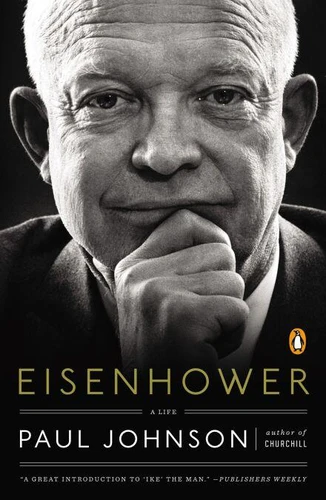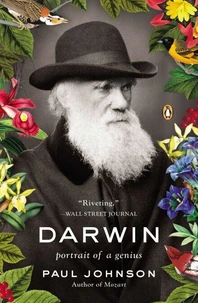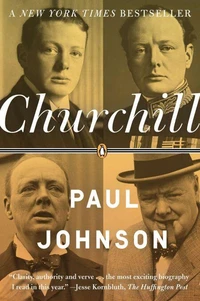Eisenhower. A Life
Par :Formats :
Disponible dans votre compte client Decitre ou Furet du Nord dès validation de votre commande. Le format ePub protégé est :
- Compatible avec une lecture sur My Vivlio (smartphone, tablette, ordinateur)
- Compatible avec une lecture sur liseuses Vivlio
- Pour les liseuses autres que Vivlio, vous devez utiliser le logiciel Adobe Digital Edition. Non compatible avec la lecture sur les liseuses Kindle, Remarkable et Sony
- Non compatible avec un achat hors France métropolitaine
 , qui est-ce ?
, qui est-ce ?Notre partenaire de plateforme de lecture numérique où vous retrouverez l'ensemble de vos ebooks gratuitement
Pour en savoir plus sur nos ebooks, consultez notre aide en ligne ici
- Nombre de pages144
- FormatePub
- ISBN978-0-698-14469-9
- EAN9780698144699
- Date de parution04/09/2014
- Protection num.Adobe DRM
- Taille2 Mo
- Infos supplémentairesepub
- ÉditeurPenguin Books
Résumé
Acclaimed historian Paul Johnson's lively, succinct biography of Dwight D. Eisenhower explores how his legacy endures today In the rousing style he's famous for, celebrated biographer Paul Johnson offers a fascinating portrait of Dwight D. Eisenhower, focusing particularly on his years as a five-star general and his time as the thirty-fourth President of the United States. Johnson chronicles President Eisenhower's modest childhood in Kansas, his college years at West Point, and his rapid ascent through the military ranks, culminating in his appointment as Supreme Commander of the Allied Forces in Europe during World War II.
Beginning when Eisenhower assumed the presidency from Harry Truman in 1952, Johnson paints a rich portrait of his two consecutive terms, exploring his volatile relationship with then-Vice President Richard Nixon, his abhorrence of isolationism, and his position on the Cold War, McCarthyism, and the Civil Rights Movement. Johnson notes that when Eisenhower left the White House at age 70, reluctantly passing the torch to President-elect John F.
Kennedy, he feared for the country's future and prophetically warned of the looming military-industrial complex. Many elements of Eisenhower's presidency speak to American politics today, including his ability to balance the budget and skill in managing an oppositional Congress. This brief yet comprehensive study will appeal to biography lovers as well as to enthusiasts of presidential history and military history alike.
Beginning when Eisenhower assumed the presidency from Harry Truman in 1952, Johnson paints a rich portrait of his two consecutive terms, exploring his volatile relationship with then-Vice President Richard Nixon, his abhorrence of isolationism, and his position on the Cold War, McCarthyism, and the Civil Rights Movement. Johnson notes that when Eisenhower left the White House at age 70, reluctantly passing the torch to President-elect John F.
Kennedy, he feared for the country's future and prophetically warned of the looming military-industrial complex. Many elements of Eisenhower's presidency speak to American politics today, including his ability to balance the budget and skill in managing an oppositional Congress. This brief yet comprehensive study will appeal to biography lovers as well as to enthusiasts of presidential history and military history alike.
Acclaimed historian Paul Johnson's lively, succinct biography of Dwight D. Eisenhower explores how his legacy endures today In the rousing style he's famous for, celebrated biographer Paul Johnson offers a fascinating portrait of Dwight D. Eisenhower, focusing particularly on his years as a five-star general and his time as the thirty-fourth President of the United States. Johnson chronicles President Eisenhower's modest childhood in Kansas, his college years at West Point, and his rapid ascent through the military ranks, culminating in his appointment as Supreme Commander of the Allied Forces in Europe during World War II.
Beginning when Eisenhower assumed the presidency from Harry Truman in 1952, Johnson paints a rich portrait of his two consecutive terms, exploring his volatile relationship with then-Vice President Richard Nixon, his abhorrence of isolationism, and his position on the Cold War, McCarthyism, and the Civil Rights Movement. Johnson notes that when Eisenhower left the White House at age 70, reluctantly passing the torch to President-elect John F.
Kennedy, he feared for the country's future and prophetically warned of the looming military-industrial complex. Many elements of Eisenhower's presidency speak to American politics today, including his ability to balance the budget and skill in managing an oppositional Congress. This brief yet comprehensive study will appeal to biography lovers as well as to enthusiasts of presidential history and military history alike.
Beginning when Eisenhower assumed the presidency from Harry Truman in 1952, Johnson paints a rich portrait of his two consecutive terms, exploring his volatile relationship with then-Vice President Richard Nixon, his abhorrence of isolationism, and his position on the Cold War, McCarthyism, and the Civil Rights Movement. Johnson notes that when Eisenhower left the White House at age 70, reluctantly passing the torch to President-elect John F.
Kennedy, he feared for the country's future and prophetically warned of the looming military-industrial complex. Many elements of Eisenhower's presidency speak to American politics today, including his ability to balance the budget and skill in managing an oppositional Congress. This brief yet comprehensive study will appeal to biography lovers as well as to enthusiasts of presidential history and military history alike.






















